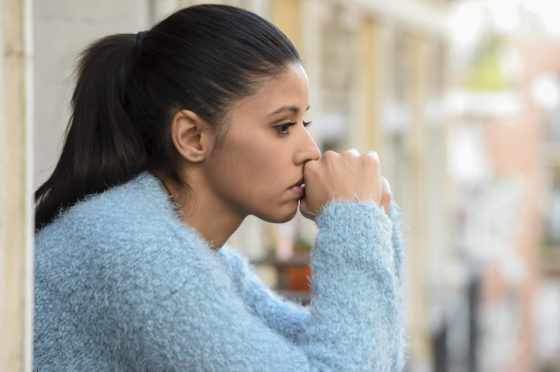Anxiety Medication While Pregnant: What You Need to Know
Article at a Glance
- If you're experiencing anxiety while pregnant, you're not alone. Nearly one-third of Americans experience anxiety during their lives, and pregnancy is a tough time that can be full of worry and stress for the health of your unborn baby.
- If you're still taking anxiety medication during pregnancy, however, you may want to stop. Anxiety drugs like Xanax, Klonopin, and Ativan are potentially dangerous during pregnancy. Those with severe anxiety will want to discuss their options with their doctor. Never stop taking a medication before consulting your OB/GYN or general practitioner.
- Those seeking natural remedies for anxiety during pregnancy are in luck. Yoga, acupuncture, prenatal massage, and a solid network of friends and family can help relieve anxiety during these important months of your and baby's lives.

This post addresses those crucial questions while offering up a few natural alternatives to prescription anxiety medication. That said, you should always consult a doctor before stopping any medication or trying anything new, as some medicines can be dangerous during pregnancy.
Contents
How is anxiety treated? What about anxiety during pregnancy?
We’ve all experienced anxiety at one time or another, whether it’s the sweaty-palmed nervousness we feel before giving a work presentation or the jittery butterflies on a first date. These types of everyday anxiety do not fall into the realm of an anxiety disorder, which can be so severe as to inhibit our daily functions, leading to panic attacks that manifest with physical symptoms such as a racing heart or pounding headache. While mild or situational anxiety do not generally require treatment, moderate to severe anxiety often do.
The most common medications doctors prescribe for anxiety disorders are Xanax, Klonopin, and Ativan. But which of these, if any, is safe to take during pregnancy?
See also: Zoloft and Pregnancy: Is it Safe?
Xanax and Pregnancy
Xanax is a Benzodiazepine drug, a classification that makes it a powerful (and sometimes addictive) treatment for anxiety and anxiety-related insomnia. Millions of people have safely taken Xanax and benefited from its calming effects. Pregnant women, however, should abstain from the drug as it comes with a host of possible adverse effects, including increased likelihood of a C-section.
According to the FDA, Xanax is a Class D drug, which makes it unsuitable for consumption during pregnancy. The FDA warns that taking Xanax during pregnancy may lead to birth defects, low birth weight, or withdrawal symptoms in the newborn.
If you have been taking Xanax prior to pregnancy, you may have concerns about stopping. But Xanax was designed for short-term use and was not intended to be taken long-term, so your pregnancy may be an ideal time to discuss other options with your prescribing physician. However, the decision to discontinue a drug is a serious one, especially for those with severe anxiety, so check with your doctor before making any changes.
Dr. Healy Smith, a reproductive psychiatrist at the Women’s Mental Health Clinic at New York-Presbyterian Hospital in New York City, adds:
“There are well documented, but often overlooked, consequences of untreated depression and anxiety during pregnancy for the fetus and the mother.”
Ironically, some of these possible consequences, such as low birth weight, are the same as those that may stem from taking anxiety medication. This fact underscores the importance of discussing all viable options, including psychotherapy, with your doctor.
Klonopin and Pregnancy
Similar to Xanax, Klonopin is a Benzodiazepine drug, which means that it is also not advisable to take during pregnancy. One study, though, yielded inconclusive results about the potential dangers of Klonopin during pregnancy. The study examined 166 infants who had been exposed to Klonopin or a similar drug in utero to determine whether they had a greater instance of congenital abnormalities. Only one child from the study was found to have birth defects, but the sample size may be too small to definitively say whether Klonopin is safe for pregnant women.
Many doctors also err on the side of caution and may be reluctant to prescribe Klonopin to pregnant patients. If you have been taking Klonopin, you may want to talk to your doctor about the possibility of discontinuing the drug or decreasing your dosage.
Ativan and Pregnancy
Rounding out the three most common anxiety drugs in the United States, Ativan is another Benzodiazepine drug that should be approached with caution. Studies regarding all forms of Benzodiazepine drugs retrieve inconsistent results, leaving the decision-making to the mother and her trusted physician.
In general, pregnant women should only take medications that are truly necessary to their health, as many — such as Lyrica, which has also been used to treat anxiety disorders — may be unsafe. For many women, peace of mind during pregnancy is the most valuable gift and, for this reason, it may be advisable to avoid all prescription anxiety medications in favor of some organic alternatives.
See also: Marijuana and Pregnancy: Just the Facts
Natural Alternatives to Anxiety Medication
You’ve probably heard of prenatal yoga as a natural remedy for stress and anxiety during pregnancy, but there are many more ways you can safely unwind. Here are a few ideas that may ease your mind and your muscles.
- Increasing in popularity as boutique studios pop up across the country, barre is a safe and effective work-out to perform during pregnancy. Borrowing from yoga, barre classes provide many of the same stress-relieving benefits. As anxiety and depression often go hand in hand, a barre fitness class can raise your dopamine levels, thus lifting your mood.
- Frequently used as a fertility booster, acupuncture may also tame anxiety during pregnancy. The National Center for Integrative and Complementary Health asserts that: “…acupuncture may help ease types of pain that are often chronic, such as low-back pain, neck pain, and osteoarthritis/knee pain.” The potential pain-relieving benefits of acupuncture may have a positive effect on anxiety, freeing you of concerns about discomfort in your body.
- Another option for both pain relief and anxiety reduction is prenatal massage, which may generally be performed safely after the first trimester of pregnancy.
Like depression, stress can precede or follow anxiety. The stress hormone cortisol not only affects you, but may be unhealthy for baby. Lean on your network and call on the pros when necessary if you’re having a stressful pregnancy.
As health practitioners increasingly understand the mind-body connection, it is crucial to take care of yourself from the inside out during pregnancy. Whether it’s a toning barre workout, an acupuncture session, a flowing massage, or some other natural remedy, there are safe and healthy ways to treat anxiety during pregnancy.







Leave a Reply
Want to join the discussion?Feel free to contribute!